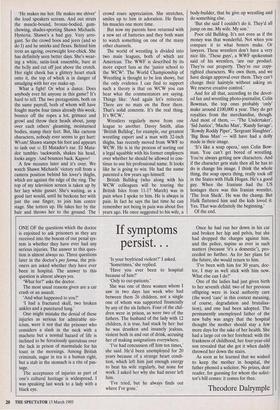If symptoms
persist.. .
ONE OF the questions which the doctor is enjoined to ask prisoners as they are received into the bosom of our penal sys- tem is whether they have ever had any serious injuries. The answer to this ques- tion is almost always no. Three questions later in the doctor's pro forma, the pris- oners are asked whether they have ever been in hospital. The answer to this question is almost always yes.
`What for?' asks the doctor.
The most usual reasons given are a car crash or an assault.
`And what happened to you?'
`I had a fractured skull, two broken ankles and a punctured lung.'
One might mistake the denial of these injuries as serious for admirable sto- icism, were it not that the prisoner who considers a slash in the neck with a machete but a normal hazard of life is inclined to be ferociously querulous over the lack in prison of marmalade for his toast in the mornings. Among British criminals, sugar in tea is a human right, but a stab in the stomach is a rite of pas- sage.
The acceptance of injuries as part of one's cultural heritage is widespread. I was speaking last week to a lady with a black eye. `Is your boyfriend violent?' I asked. `Sometimes,' she replied.
`Have you ever been to hospital because of him?'
`Only to out-patients.'
She was one of three women whom I saw in two days last week who had between them 26 children, not a single one of whom was supported financially by any of the six fathers. Four of the chil- dren were in prison, as were two of the fathers. The husband of the lady with 12 children, it is true, had stuck by her: but he was drunken and insanely jealous, violent both in and out of drink, accusing her of making assignations everywhere.
`I've had concussion off him ten times,' she said. He'd been unemployed for 20 years because of a strange heart condi- tion, which left him just enough energy to beat his wife regularly, but none for work. I asked her why she had never left him.
`I've tried, but he always finds out where I've gone.' Once he had run her down in his car and broken her hip and pelvis, but she had dropped the charges against him, and the police, supine as ever in such matters (because 'it's a domestic'), pro- ceeded no further. As for her plans for the future, she would return to him.
`I've been with him for 30 years, doc- tor, I may as well stick with him now. What else can I do?'
One of the ladies had just given birth to her seventh child: two of her previous offspring were in local authority care (the word 'care' in this context meaning, of course, degradation and brutalisa- tion), and one had been adopted. The permanently unemployed father of the new baby was angry that the hospital thought the mother should stay a few more days for the sake of her health. She had a large cut on her forehead: with the frankness of childhood, her four-year-old son revealed that she got it when daddy throwed her down the stairs.
As soon as he learned that we wished to keep the mother in hospital, the father phoned a solicitor. No prizes, dear reader, for guessing for whom the solici- tor's bill comes: it comes for thee.
Theodore Dalrymple


























































 Previous page
Previous page